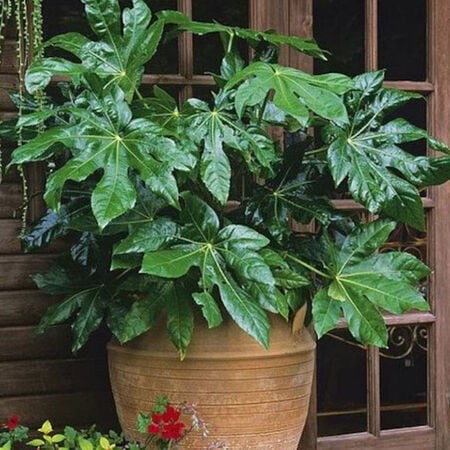Fatsia, Japonica Seed
Key Attributes
A beautifully bold, shiny, dark green palmate leaves more than 1' across, forms a large, rounded, open shrub, white flowers in fall, should be grown in bright, indirect light. Often grown as a house plant, native to Japan. Also know as paper plant.
Seed Germination: Find a bright, indirect spot within your home. Plant 1/8" below soil and keep soil 80F with heat mat. Keep soil moist and avoid drying out. Should germinate within 2-4 weeks.
Key Attributes
Product Details
Weight
0.008Depth
0.1Height
4.5Width
3.25Botanical Name
Fatsia japonicaSeed Type
SeedSeeds Per Gram
205Packet
10 SeedsSow Depth
1/8"Sun
Indirect LightUses
HouseplantComponents
Growing Instructions
Shipping Schedule
Our Seed Promise
 "Agriculture and seeds" provide the basis upon which our lives depend. We must protect this foundation as a safe and genetically stable source for future generations. For the benefit of all farmers, gardeners and consumers who want an alternative, we pledge that we do not knowingly buy or sell genetically engineered seeds or plants.
"Agriculture and seeds" provide the basis upon which our lives depend. We must protect this foundation as a safe and genetically stable source for future generations. For the benefit of all farmers, gardeners and consumers who want an alternative, we pledge that we do not knowingly buy or sell genetically engineered seeds or plants.
The mechanical transfer of genetic material outside of natural reproductive methods and between genera, families or kingdoms, poses great biological risks as well as economic, political, and cultural threats. We feel that genetically engineered varieties have been insufficiently tested prior to public release. More research and testing is necessary to further assess the potential risks of genetically engineered seeds. Further, we wish to support agricultural progress that leads to healthier soils, to genetically diverse agricultural ecosystems, and ultimately to healthy people and communities.
To learn more about the "Safe Seed Pledge" please visit www.councilforresponsiblegenetics.org.

